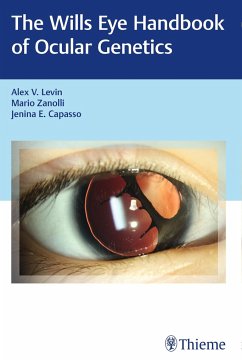Highly Commended by the BMA Medical Book Awards for Surgical Specialties!
Many serious, potentially blinding eye disorders have a genetic basis. Currently, there are relatively few ocular geneticists in the world, yet inherited eye disease is one of the leading causes of blindness worldwide. Significant strides have been made in gene identification and acquisition of knowledge on the underlying mechanisms of hereditary eye disease. The field of ocular genetics is becoming an increasingly relevant part of ophthalmologists' purview. This has resulted in a dire need for a comprehensive textbook ophthalmologists and other professionals who work with patients with genetic disorders can utilize to gain a better understanding of inherited eye disorders.
The Wills Eye Handbook of Ocular Genetics, by Alex Levin, Mario Zanolli, and Jenina Capasso of Wills Eye Hospital, is a practical, reader-friendly guide on the diagnosis and management of ophthalmic genetic conditions. Every chapter begins with a disease overview, followed by relevant modern genetic concepts, pathways to attaining the correct diagnosis, and pitfalls and pearls gleaned from years of hands-on expertise. At the end of each chapter, questions and answers enable readers to test their knowledge in real-life scenarios they might face in everyday practice. The ultimate goal of this clinically robust handbook is to facilitate optimal patient management and outcomes.
Key Features
- Fundamentals, including basic genetics, inheritance patterns, genetic testing, and ethical issues
- Patient-centered genetic counseling issues such as reproduction, dealing with emotional reactions, prognosis, and future options
- Anterior segment disorders - from corneal dystrophies and aniridia - to childhood cataract and microphthalmia
- A broad spectrum of vitreoretinopathies and retinal diseases including incontinentia pigmenti, retinitis pigmentosa, Bardet-Biedl syndrome, choroideremia, Stargardt disease, achromatopsia, and juvenile X-linked retinoschisis
This textbook is essential reading for practitioners at all levels and in all subspecialties including ophthalmology and genetics. They will find it an excellent resource for navigating the complexities of genetic eye disease.
Many serious, potentially blinding eye disorders have a genetic basis. Currently, there are relatively few ocular geneticists in the world, yet inherited eye disease is one of the leading causes of blindness worldwide. Significant strides have been made in gene identification and acquisition of knowledge on the underlying mechanisms of hereditary eye disease. The field of ocular genetics is becoming an increasingly relevant part of ophthalmologists' purview. This has resulted in a dire need for a comprehensive textbook ophthalmologists and other professionals who work with patients with genetic disorders can utilize to gain a better understanding of inherited eye disorders.
The Wills Eye Handbook of Ocular Genetics, by Alex Levin, Mario Zanolli, and Jenina Capasso of Wills Eye Hospital, is a practical, reader-friendly guide on the diagnosis and management of ophthalmic genetic conditions. Every chapter begins with a disease overview, followed by relevant modern genetic concepts, pathways to attaining the correct diagnosis, and pitfalls and pearls gleaned from years of hands-on expertise. At the end of each chapter, questions and answers enable readers to test their knowledge in real-life scenarios they might face in everyday practice. The ultimate goal of this clinically robust handbook is to facilitate optimal patient management and outcomes.
Key Features
- Fundamentals, including basic genetics, inheritance patterns, genetic testing, and ethical issues
- Patient-centered genetic counseling issues such as reproduction, dealing with emotional reactions, prognosis, and future options
- Anterior segment disorders - from corneal dystrophies and aniridia - to childhood cataract and microphthalmia
- A broad spectrum of vitreoretinopathies and retinal diseases including incontinentia pigmenti, retinitis pigmentosa, Bardet-Biedl syndrome, choroideremia, Stargardt disease, achromatopsia, and juvenile X-linked retinoschisis
This textbook is essential reading for practitioners at all levels and in all subspecialties including ophthalmology and genetics. They will find it an excellent resource for navigating the complexities of genetic eye disease.

